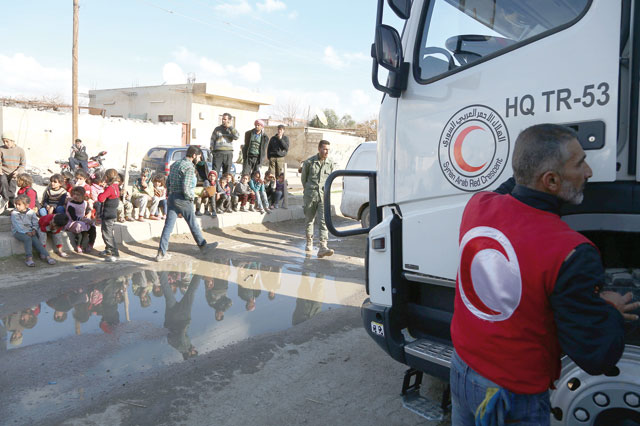Damascus — The Syrian government on Wednesday denied it possessed chemical weapons and branded the use of such arms “immoral and unacceptable”, following a French warning of punitive strikes.
As Damascus dismissed suspicions of chlorine attacks on rebel-held areas including besieged Eastern Ghouta, the first aid convoy since November entered the battered enclave near the capital.
“Syria’s government categorically denies possessing... chemical weapons,” said Deputy Foreign Minister Faisal Mekdad, quoted by state news agency SANA.
“We consider the use of such arms as immoral and unacceptable, whatever the context.”
On Tuesday, France’s President Emmanuel Macron warned his country would launch strikes if proof emerged that the Syrian regime had used banned chemical weapons against its civilians.
According to Washington, at least six chlorine attacks have been reported since early January in rebel-held areas, resulting in dozens of injuries.
Damascus last month also denied carrying out chemical attacks and its ally Moscow denounced such charges as a “propaganda campaign”, stressing the perpetrators had not been identified.
France, like the United States, suspects the Syrian regime but says it does not yet have concrete evidence on the nature and origin of the attacks.
Damascus has repeatedly been accused of using chemical weapons, despite a 2013 deal between the United States and Russia for Syria to destroy its stockpiles.
The United Nations was among those who blamed government forces for an April 2017 sarin gas attack on the opposition-held village of Khan Sheikhoun that left scores dead.
In retaliation for that alleged attack, the United States carried out cruise missile strikes on a Syrian regime airbase.
Aid reaches rebel enclave
As Assad’s opponents ratcheted up pressure, there was some respite with the arrival of the first aid convoy in months in rebel Eastern Ghouta after intensive bombardments last week killed 250 civilians.
“First UN and Syrian Red Crescent inter-agency convoy this year crossed conflict lines to Nashabieh in Eastern Ghouta to deliver food, health and nutrition supplies for 7,200 people in the besieged enclave,” the UN humanitarian affairs office said.
Some 400,000 people live in the enclave outside Damascus where they have been under siege by the army since 2013, facing severe food and medicine shortages.
The UN Security Council is considering a draft resolution demanding a 30-day ceasefire in Syria to allow for urgent deliveries of humanitarian aid.
Sweden and Kuwait presented the draft, which would also demands an immediate end to sieges, including on Eastern Ghouta, after regime ally Russia last week rejected as “not realistic” a similar appeal by UN aid officials.
The United Nations has said that violence in Syria has only worsened since it first called for a truce last week, with “some of the worst fighting of the entire conflict” being witnessed.
President Bashar Assad’s forces have bludgeoned their way ahead with the help of Russian air power in the war that has claimed more than 340,000 lives since 2011.
Beyond pounding Eastern Ghouta, the regime is conducting an offensive in the northwestern Idlib province, the only one that had remained completely out of its grip.
Further to the north, Turkey is also carrying out a major operation in the Afrin region against Kurdish miltia that have received backing from the US.
